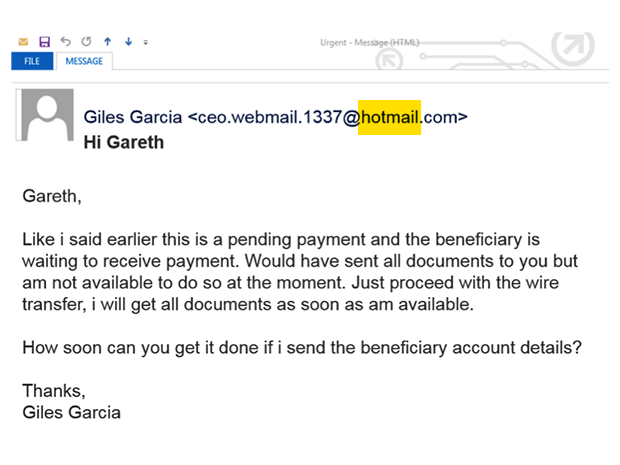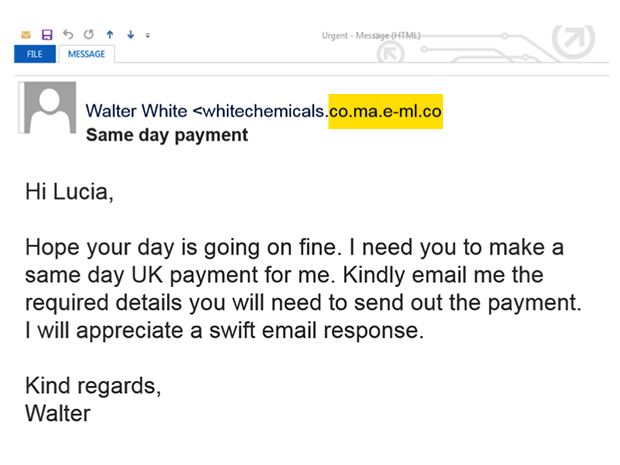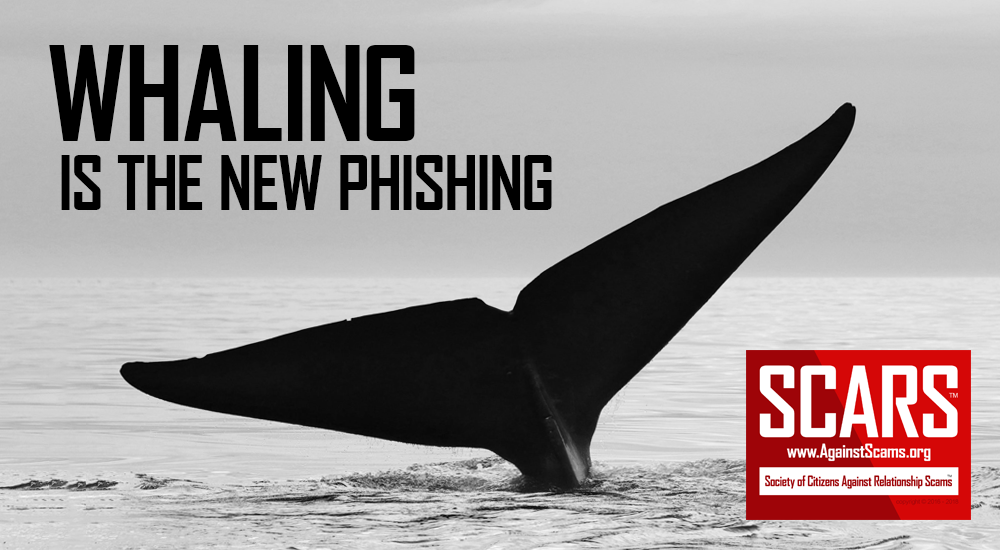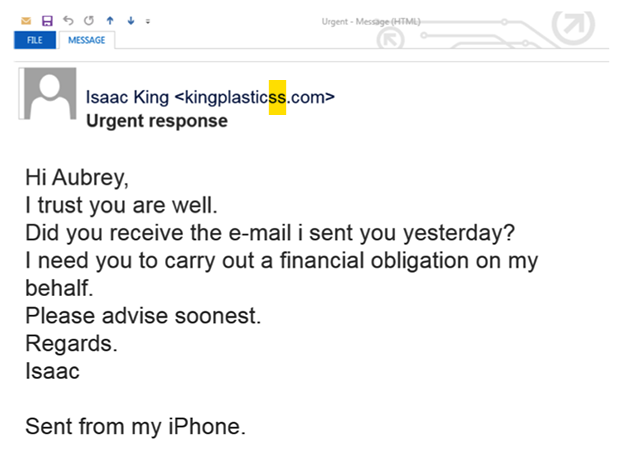SCARS™ Guide: There Is A New Kind Of Phishing Called Whaling Scam Attacks
Whaling: How It Works, And What Your Organisation Can Do About It
A GUIDE TO ‘WHALING’ – TARGETED PHISHING ATTACKS AIMED AT SENIOR EXECUTIVES
Whaling is a highly targeted phishing attack – aimed at senior executives – masquerading as a legitimate email. Whaling is digitally enabled fraud through social engineering, designed to encourage victims to perform a secondary action, such as initiating a wire transfer of funds.
Whaling does not require extensive technical knowledge yet can deliver huge returns. As such, it is one of the biggest risks facing businesses. Financial institutions and payment services are the most targeted organizations, however, cloud storage and file hosting sites, online services, and e-commerce sites are receiving a larger share of attacks.
Whaling emails are more sophisticated than generic phishing emails as they often target chief (‘c-level’) executives and usually:
- Contain personalized information about the targeted organization or individual
- Convey a sense of urgency
- Are crafted with a solid understanding of business language and tone
What Are The Consequences Of Whaling?
Whaling emails are a form of social engineering which aims to encourage their victim to take a secondary action such as:
- Clicking on a link to a site which delivers malware
- Requesting a transfer of funds to the attacker’s bank account
- Requests for additional details about the business or individual in order to conduct further attacks
Financial loss
The 2016 Phishing Trends and Intelligence report by PhishLabs™ found that 22% of spearphishing attacks analyzed in 2015 were motivated by financial fraud or related crimes. The table below illustrates five of the largest financial losses to organizations as a result of whaling emails. In these examples, a senior executive received a fraudulent email requesting a transfer of funds, from what appeared to be a trusted supplier, partner or member of the organization.
Clicking on a link or downloading an attachment in an email can result in corporate networks becoming infected with malware. This can result in data breaches such as the loss of customer data or intellectual property theft.
Reputational Damage From Whaling
Financial or data loss through a whaling attack can be extremely embarrassing to both an organization and an individual. FACC, an Austrian aerospace manufacturer that lost €50 million UK Pounds as a result of a targeted email attack in 2016, decided to fire several members of staff including the CEO, for their involvement in the incident.
Recent Changes In Common Whaling Tactics
Initially, whaling emails were not much harder to identify than their less targeted phishing counterparts. However, the adoption of fluent business terminology, industry knowledge, personal references, and spoofed email addresses have made sophisticated whaling emails difficult for even a cautious eye to identify. Highly targeted content is now combined with several other methods that executives should be aware of to reduce their chances of falling victim to a whaling attack. Crucially all these developments either exploit existing trusted relationships or combine a cyber-attack with non-cyber fraud tactics.
Whaling Email Followed Up With A Phone Call
The NCSC is aware of several incidents whereby a whaling email was received and then followed-up with a phone call confirming the email request.
This is a social engineering tactic that could be described as cyber-enabled fraud. The phone call serves the dual purpose of corroborating the email request and making the victim complacent about a possible cyberattack as they have also had a ‘real world’ interaction.
Whaling email from malicious actors masquerading as a trusted partner!
The rise of supply chain attacks (where a supplier or partner organization’s network is compromised in order to gain access to the target organization) has been well documented. However, recent whaling attacks have used easily accessible information on suppliers or partners to construct whaling emails that appear credible.
If an organization advertises partners such as charities, law firms, think tanks or academic institutions, they should be aware that they may receive emails from malicious actors masquerading as those trusted partners.
Whaling emails that appear to be from colleagues!
This is when an employee email address is either compromised (or a spoofed email address is used) to convince other employees that they are receiving a legitimate request from a colleague.
This is especially effective when the email address of a very senior executive is spoofed to request an urgent payment to a junior member of (for example) a finance department.
Whaling Through Social Media
Online social networking is an increasingly prevalent way of developing business contacts, recruiting employees and hosting discussions. However social media accounts, both professional and personal, provide a means for malicious actors to research and make contact with senior executives. They provide a goldmine of information for social engineering, and victims are often less vigilant to attack in a more social forum. According to Proof Point, there was a 150% increase in social media phishing attacks in 2015 (more recent data is not yet available).
Catching Your White Whale
It is crucial to remember that whaling is a means of social engineering, and malicious actors will use methods exploiting established trust structures, existing outside the cyber-realm, to reassure the victim.
Simply making your employees aware of social engineering threats doesn’t make them invulnerable; some attacks are too well crafted and no amount of user awareness and training can guarantee their detection. Employee and executive training on social engineering tactics should be considered part of a series of technical and user-based defenses against attacks, but recognize the limitations of such measures.
Similarly, whilst organizations should ensure training is supported by hardened technical defenses, malicious actors are increasingly employing techniques to evade automated detection and prevent analysis of attack methodology. As such, organizations should accept that a successful whaling attack is a possibility, and put in place checks and processes to mitigate the damage.
Whaling Examples
The following real-life whaling attempts show the intricate changes perpetrators try to make to trick a CEO.

Whaling attempt where the attacker has created a Hotmail account that could appear to be a CEO webmail service. Source: NCSC.GOV.UK

Whaling attempt where the attacker has registered a similar domain name, replacing the “o’s” with similar and easily overlooked zeros. Source: NCSC.GOV.UK

Whaling attempt where the attacker has registered a similar-looking domain name to the actual White Chemicals. Source: NCSC.GOV.UK
If your organization is looking for help to properly train your staff on Whaling and Social Engineering threats look no further than SCARS! One of the SCARS divisions specializes in providing business support for scams. Please visit www.USGCP.com » for more information.
Remember
Whaling, Spearphishing, and Phishing all depend on a willing victim to allow them to succeed!
Only by training and behavioral change can you defend against social engineering attacks – this is true for enterprises and consumers alike!
PLEASE SHARE OUR ARTICLES WITH YOUR CONTACTS
HELP OTHERS STAY SAFE ONLINE
SCARS™ Team
A SCARS Division
Miami Florida U.S.A.
TAGS: SCARS, Important Article, Information About Scams, Anti-Scam, Whaling Scam Attacks, Spearphishing Attacks, Phishing Scams, Corporate Penetration Attacks Via Email, Social Engineering Attacks
The Latest SCARS|RSN Posts
FIND MORE SCAM NEWS
«SCAMCRIME.COM»
CHAT WITH SCARS™
«CLICK HERE»
END
MORE INFORMATION
– – –
Tell us about your experiences with Romance Scammers in our
« Scams Discussion Forum on Facebook »
– – –
FAQ: How Do You Properly Report Scammers?
It is essential that law enforcement knows about scams & scammers, even though there is nothing (in most cases) that they can do.
Always report scams involving money lost or where you received money to:
- Local Police – ask them to take an “informational” police report – say you need it for your insurance
- U.S. State Police (if you live in the U.S.) – they will take the matter more seriously and provide you with more help than local police
- Your National Police or FBI « www.IC3.gov »
- The SCARS|CDN™ Cybercriminal Data Network – Worldwide Reporting Network « HERE » or on « www.Anyscam.com »
This helps your government understand the problem, and allows law enforcement to add scammers on watch lists worldwide.
– – –
Visit our NEW Main SCARS Facebook page for much more information about scams and online crime: « www.facebook.com/SCARS.News.And.Information »
To learn more about SCARS visit « www.AgainstScams.org »
Please be sure to report all scammers
« HERE » or on « www.Anyscam.com »
Legal Notices:
All original content is Copyright © 1991 – 2020 SCARS All Rights Reserved Worldwide & Webwide. Third-party copyrights acknowledge.
SCARS, RSN, Romance Scams Now, SCARS|WORLDWIDE, SCARS|GLOBAL, SCARS, Society of Citizens Against Relationship Scams, Society of Citizens Against Romance Scams, SCARS|ANYSCAM, Project Anyscam, Anyscam, SCARS|GOFCH, GOFCH, SCARS|CHINA, SCARS|CDN, SCARS|UK, SCARS Cybercriminal Data Network, Cobalt Alert, Scam Victims Support Group, are all trademarks of Society of Citizens Against Relationship Scams Incorporated.
Contact the law firm for the Society of Citizens Against Relationship Scams Incorporated by email at legal@AgainstScams.org

















Please Leave A Comment - Tell Us What You Think About This!